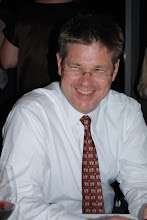If both were the same race, would there have been a different outcome? I doubt it.
A friend in Boston – we have known each other well for 30 years ; he is black and I am white – have talked a lot about the reporting on what happened between Professor Gates and Sargent Crowley in Cambridge. He asked me today, ‘What would have happened if Prof. Gates had been white?’ My immediate reaction was that nothing substantive in what went on between the two would have been different; there probably would have been no media reporting either. I have been thinking about this all day – what caused the interaction between what appear to be two level-headed, well-intentioned and responsible men was miscommunication rooted in legitimate but conflicting expectations of deference. The NY Times has a lengthy piece today that speaks to this. Professor Gates, a citizen in his own home with no knowledge that anything amiss had been reported, had a legitimate expectation that the policeman at his door was not there to investigate or question him or his actions, and would exhibit respect and deference to the sanctity of that home. Sargent Crowley, invested with the authority to investigate potential crimes and, if necessary, use force, had the legitimate expectation that a person in a house where something amiss had been reported would exhibit respect and deference to his lawful authority. Two honorable men were talking right past each other. If we are honest, we will acknowledge that race may have been a factor in each man’s response. We would also have to acknowledge that race did not spark the interaction or determine its outcome. See today’s article in the New York Times.
Monday, July 27, 2009
Saturday, July 25, 2009
'The Monuments Men' - Robert M. Edsel
'The Monuments Men' - Robert M. Edsel
Untold story of rescuing Europe’s art after D-Day –great art, heroes, exploding mines, venal Nazis.
‘The Monuments Men, ’scheduled for publication in September 2009, chronicles the efforts of a small, understaffed group of Allied officers and enlisted men to recover art looted from across Europe. A little heavy on reconstructed conversations and internal dialogues, the book nonetheless paints effective portraits of the diverse group of Monuments Men and their efforts from D-Day through the end of the war in Europe and beyond. An interesting account of something I knew of , but not about.
http://www.monumentsmenfoundation.org/
Untold story of rescuing Europe’s art after D-Day –great art, heroes, exploding mines, venal Nazis.
‘The Monuments Men, ’scheduled for publication in September 2009, chronicles the efforts of a small, understaffed group of Allied officers and enlisted men to recover art looted from across Europe. A little heavy on reconstructed conversations and internal dialogues, the book nonetheless paints effective portraits of the diverse group of Monuments Men and their efforts from D-Day through the end of the war in Europe and beyond. An interesting account of something I knew of , but not about.
http://www.monumentsmenfoundation.org/
'Bad Things Happen' by Harry Donlan
Murder mystery; mystery writers; mysterious hero - slightly literary quasi-procedural with a little thrill. Strong main characters, secondaries a little sketchy. Good for the summer - think P.D. James on the beach.
Wednesday, July 22, 2009
"Information Officer" by Mark Mills
Not yest available in the US, 'The Information Officer' is the third book by UK author by Mark Mills. A murder mystery wrapped in World War II in the Mediterranean supported by well-crafted characters and a good dose of history, this is a great summer read for anyone who generally prefers highly-detailed and usually heavy non-fiction. I have not read his first, 'Amaganset,' but his second, 'The Savage Garden,' is a great read - one of the few novels that I recommend to anyone.
Subscribe to:
Comments (Atom)
